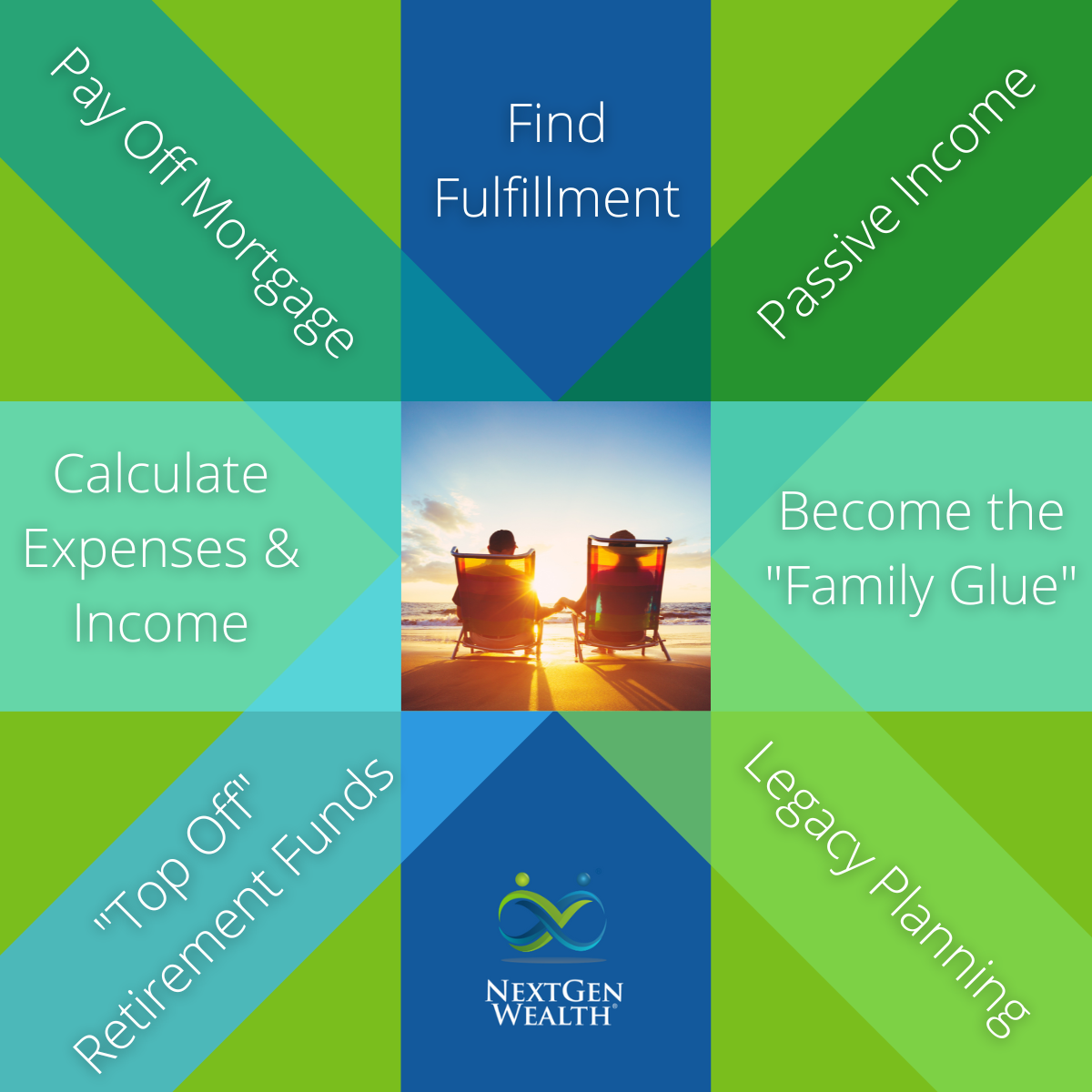7 Goals to Accomplish When You Retire

This post was last updated on January 04, 2025, to reflect all updated information and best serve your needs.
You’ve reached many milestones in your life so far, but retirement brings new challenges and opportunities. There are many goals that you may be looking forward to already or maybe you’re going back to the drawing board.
Remember, retiring isn’t the end of the road; it’s the beginning of a whole new chapter. Here are some worthwhile goals to consider as you enter your next chapter and beyond.
Pre-Retirement Goals
As you approach retirement, it’s critical that you get the finishing touches right. Retirement looks different for everyone, but as an advisor to many retirees, we can tell who’s prepared the best.
Increase Your Retirement Contributions
As you reach your final working years, you have a great opportunity to “top off” your retirement accounts. For those that are over age 50, you can make catch-up contributions to your qualified retirement accounts. This can be a great way to get the last little bit needed to fund your retirement goals.
For 2025, the catch-up contributions are an additional $7,500 per year (on top of $23,500) for qualified defined contribution plans such as a 401(k) or 403(b). If you're age 60-63, you can contribute up to an additional $11,250. This is also the same limit for the federal Thrift Savings Plan.
For Individual Retirement Accounts (IRAs), the catch up is $1,000 on top of $7,000 for Roth and traditional IRAs. This means you could potentially add an extra $39,000 per year using just your contributions to a 401(k) and IRA.
Calculate Your Earnings and Expenses
It may be challenging to figure out a retirement budget initially. Realistically, you’ll have to start calculating these figures as you get closer. You’ll have a much better idea of what your life looks like and the size of your nest egg.
Expenses
You want to make a comprehensive list of expenses before and during retirement. There may be things you miss, but we can get pretty close. A good baseline is to start tracking your expenses now and then look at what expenses will remain, increase, decrease, or stop in retirement.
Here are some items to consider:
- Mortgage and Utilities - ideally, you’ll pay off your home mortgage at some point during retirement (if not before). If you rent, then be sure to consider yearly increases, as rent will continue to go up in the future.
- Average Living Expenses - have an idea of what you spend on things like groceries, gas, and other items. When you retire, you might pay less in gas for the commute or more if you start traveling a lot.
- Medical Expenses - as we get older, our bodies require more care. If your health insurance is tied to work, you need to have a plan for retirement. Consider premium payments, co-pays, as well as any other out-of-pocket expenses.
- Assisted Living - long-term care costs can eat into your nest egg quickly. Start looking at the average price for care in your area so you have an idea of what to expect.
- Life Insurance – this is a conversation that you’ll likely want to revisit in or near retirement. If you already have coverage, you may want to adjust, add, or drop it. You’ll want to consider what expenses need to be covered should you pass prematurely.
- Taxes - owning a home means property taxes, which will increase as your home appreciates. Also, if you have a lot of your money in qualified retirement accounts, they will be subject to Required Minimum Distributions (RMDs) at some point which could raise your income taxes.
Retirement Income
Your income will need to cover your expenses. In retirement, you create your own stream(s) of income. The name of the game is to convert your retirement savings into “paychecks” to yourself to cover all your expenses without ever running out of money.
You’ll want to consider the following sources of retirement income:
- Pension Income – if you are fortunate enough to have a pension, start calculating what that pension will look like and take the final steps to maximize your benefits.
- Qualified Retirement Accounts – your 401(k), Thrift Savings Plan (TSP), or other retirement account will now be converted into a stream of income. The type of retirement account matters too. You may need to start utilizing tax strategies like Roth Conversions to avoid taxes and RMDs.
- Passive Income – if you have an ownership stake in a business, receive royalties, or rental income, these should be factored in as well.
- Social Security – don’t forget to include Social Security in your calculations too. You’ll want to start considering what your strategy for Social Security will be before it’s time to begin. You DO NOT want to make this decision on your first visit to the Social Security office.

Retirement Goals
Once you retire, it’s time to celebrate! However, it’s even more important to define what you’re retiring to – not what you’re retiring from.
Consider these goals to achieve during your golden years.
Pay Off the Mortgage
One of the most common, and worthwhile, goals that many retirees have is paying off their primary residence. This is a very worthwhile goal. In theory, if you bought your home on a 30-year mortgage in your 30’s, you might be pretty close to paying off the house regardless.
Paying your house off can give you more peace of mind and feel more stability in retirement. Also, this significantly reduces your expenses. You’ll still have property taxes to contend with (not true for all states), but that’s something we can’t avoid.
Consider Downsizing
During your working years, the size of your home may have increased over time. This is to be expected as your income and family grew over time. However, during retirement, a nice, big house may be more than you bargained for.
The yard needs to be maintained, rooms cleaned, and taxes need to be paid. If you don’t need much space during your later years, is it still worth it? If regular maintenance and upkeep are costly, you can consider moving to a smaller home to save on monthly expenses.
However, you might want to leave the house for your children. Maybe you finally have time to put that kitchen remodel to use and entertain guests and family for annual holiday dinners. If your house still brings you value, then downsizing may not be right for you.
Finding Fulfillment
Now that you’re retiring, what are your goals for the next 20 to 30 years? For many people, now is the time to travel, but you’ll want to think about alternatives as well. Presumably, you won’t be jet-setting around the world 12 months a year.
Some options for getting more out of retirement than free time include:
- Volunteering – get active with local charities and donate your time and energy. Find a charity that shares your passion for an even greater reward.
- Complete Bucket List Items – now that you’re not working, it’s time to check off those feats you’ve always wanted to achieve. If you don’t have a bucket list, create one. Don’t forget the smaller items, too – not everything has to be life-changing.
- Teach a Class – having decades of experience means that you have plenty of knowledge to share. It’s never been easier to build online curriculum, or you can teach at a local community center.
- Learn a New Skill – on the flip side of things, you can take this opportunity to learn something you’ve never tried before. Whether it’s juggling, playing an instrument, or something more substantial, it’s never too late to add to your resume.
- “Supercharge” Your Hobbies – whether you’re into woodworking, homebrewing, or art, now is a great time to really have fun. Maybe you even want to turn a hobby into a small side hustle too?
Develop a Passive Income Stream
Even if you’re not worried about running out of money in retirement, having passive income is not a bad idea. You can put the funds toward a big trip or purchase (like an RV), or you can save it for your kids. Here are a few ideas to generate extra money without having to punch the clock.
- Rent Out Space – if you have extra bedrooms in your home, consider renting them out. You’ll have to fill out paperwork and maybe do some light renovation, but you can get more than you might think. You can use websites like Airbnb or Vrbo to rent out a single room or the whole house if you want.
- Invest in a Rental Property – if you don’t want to rent a room in your home, you may decide investing in a separate rental property would be worthwhile. Granted, being a landlord has its share of work involved. However, you could hire a property manager to handle this for you.
- Sell Crafts Online – if your retirement hobby is related to arts and crafts, you could earn income by selling on sites like Etsy.
Become the “Family Glue”
It might sound strange, but every family has one or two people that are the “glue” holding the family together. Many of us think back to family dinners, reunions, or vacations. Many families feel more and more distant even though we’re more connected than ever before.
All it takes is some time, money, and effort put into planning and you could bring some of these old traditions back to life. Now that you have a little more time on your hands, you can rekindle one-on-one relationships with family members that you don’t get to see as often anymore.
No matter what, you’ll never regret trying to create more memories with the people you care about. Even if you don’t want to be the one organizing everything, maybe you can inspire someone else to take on that task.
Finalizing Your Legacy
One of the least fun, yet most important goals many retirees have is what they’ll leave behind. Estate planning is critical as you enter retirement. What are you going to leave behind for your children? What about your spouse?
Now is the time to start making moves regarding where your assets will be placed and how they will be distributed. Consider creating a trust to avoid probate and be sure to talk to your loved ones so that they know what to expect.
Also, now is the time to think about your end-of-life expenses. Discuss your wishes as well so that there is no confusion or guilt. It may not be a happy subject, but it’s better to talk about it now than leave your loved ones wondering.
Why Your Goals Are Important to NextGen Wealth
Your goals are the most important aspects we use to help craft a financial plan with you. We use our COLLAB Financial Planning Process™ to help you define your goals and unlock what’s possible in retirement. The goals we talked about here are only a suggestion based on what we’ve seen – your dreams may be completely different.
Whether you’re 5 years from retirement or just retired yesterday, getting your goals and priorities in order is vitally important. We also don’t want you to skip a goal or dream because you don’t think you can afford it – that’s where our expertise comes in. It’s never too early to get started planning your retirement.


